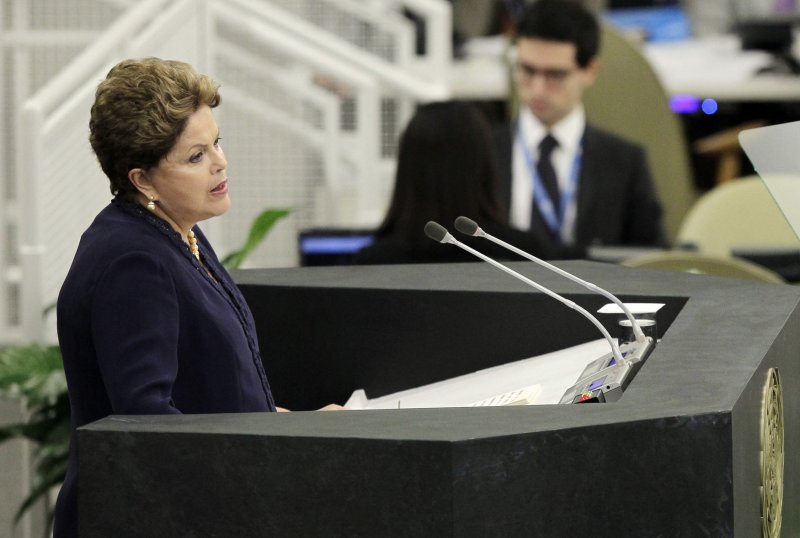Brazilian President Dilma Rousseff addresses the United Nations General Debate at the 68th United Nations General Assembly in the UN building in New York City on September 24, 2013. UPI/John Angelillo |
License Photo
RIO DE JANEIRO, Nov. 14 (UPI) -- Brazilian President Dilma Rousseff is pushing legislation to give the government greater control over data processed by Google, Microsoft and other IT giants.
That data includes all email traffic and Internet usage as well as ancillary services such as Google's mapping program that led to Brazil demanding access to street view data collected by the U.S. company in Brazil.
Rousseff sought tougher oversight of U.S. information technology companies active in Brazil after reports the U.S. National Security Agency spied on her, senior aides and other government functionaries.
The Brazilian president demonstrated her ire by calling off an official visit to Washington and talks with U.S. President Barack Obama. During U.N. meetings in New York in September Rousseff delivered a sharp attack on the United States, saying NSA actions violated international law.
U.S. companies in Brazil are under increasing scrutiny and Rousseff has ordered government departments to avoid using Google, Microsoft and Yahoo email services.
New legislation that Rousseff wants rushed through congress will require Google and other Internet companies to store all Brazil-related data within the country and to have it on call for examination by Brazilian government agencies.
Google and other U.S. companies say compliance will escalate their costs and also expose them to hefty fines.
In the furor this month on Google street view data, Brazilian judges ordered Google to hand over all street data obtained by Google vans operating across the country. Critics say Google technology allows the IT giant not only to capture images but also to eavesdrop on private WiFi and other local communications. Google hasn't denied the accusation.
Brazilian courts warned Google of fines of up to $500,000 for non-compliance with the order to hand over the data.
The Brazilian Institute of Computer Policy and Rights said it knew Google engaged in similar electronic data interception in other parts of the world and called on the company to categorically state it hadn't done the same in the Latin American country.
Reports of U.S. intelligence gathering activities first emerged from documents released by U.S. secrets-leaker Edward Snowden, who now lives in Russia after Moscow granted him asylum. Snowden is sought by U.S. authorities but has offered to cooperate with German officials on a European investigation of his activities.
The spying debate has put on hold most of business exchanges that appeared to be growing after Obama visited Brazil and neighboring countries in March 2011. Questions have arisen on U.S. participation in a Brazil defense procurement program that includes a multi-billion dollar contract for next generation fighter aircraft for the Brazilian air force.
Google and other U.S. technology companies so far have resisted Brazilian demands for a data center based in the country. Faced with potential exclusion from Brazil's thriving economy and hefty fines, the companies are said to be resigned to complying with Brazilian government demands, local news media reported.
Brazil is also said to be considering similar controls on other Western technology companies, including British and other European businesses active in the country.















